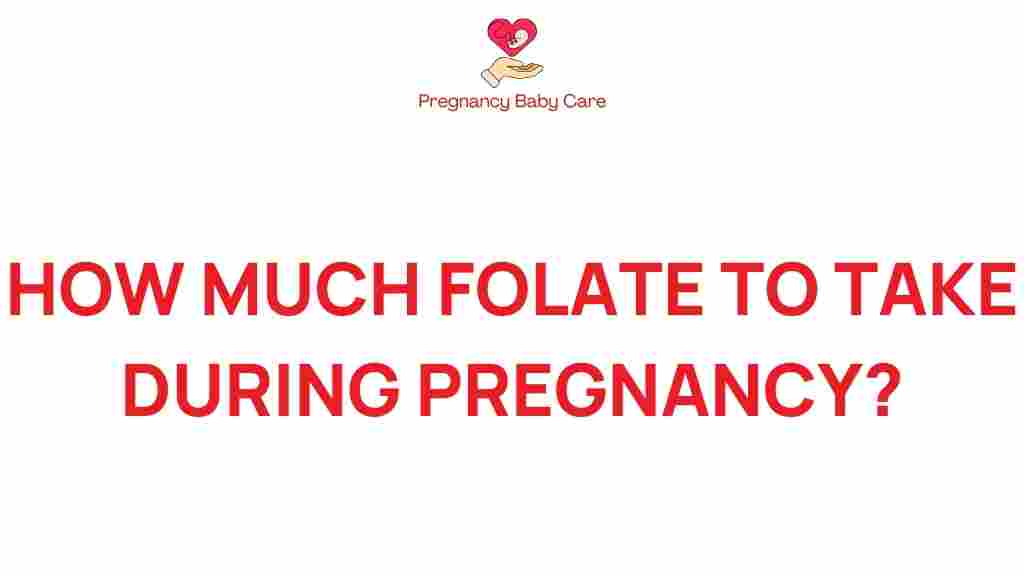The Essential Guide to Folate: How Much Do You Really Need During Pregnancy?
Pregnancy is a critical time for nutritional health, and one of the most important nutrients to consider is folate. Adequate folate intake during pregnancy is vital for the development of the fetus and can significantly affect health outcomes for both the mother and child. This essential guide will walk you through the importance of folate, its recommendations, dietary sources, and the role of prenatal vitamins and supplements in ensuring your nutritional needs are met.
What is Folate and Why is it Important?
Folate, also known as vitamin B9, is a water-soluble B vitamin that plays a crucial role in DNA synthesis and repair, cell division, and overall growth. During pregnancy, folate is particularly important for the following reasons:
- Fetal Development: Folate is essential for the proper development of the neural tube, which forms the baby’s brain and spinal cord.
- Preventing Birth Defects: Adequate folate levels can reduce the risk of neural tube defects (NTDs) such as spina bifida and anencephaly.
- Maternal Health: Folate supports the increased blood volume and production of red blood cells during pregnancy.
Recommended Folate Intake During Pregnancy
The recommended dietary allowance (RDA) for folate varies depending on the stage of pregnancy:
- Pre-Pregnancy: 400 micrograms (mcg) of dietary folate equivalents (DFE) per day.
- During Pregnancy: 600 mcg DFE per day.
- During Lactation: 500 mcg DFE per day.
These recommendations ensure that both the mother and the developing fetus receive adequate amounts of this crucial nutrient. It is important to note that these values include folate obtained from food as well as supplements.
Dietary Sources of Folate
Incorporating folate-rich foods into your diet is an excellent way to meet your nutritional needs during pregnancy. Some of the best dietary sources of folate include:
- Leafy Greens: Spinach, kale, and collard greens are excellent sources.
- Legumes: Lentils, chickpeas, and black-eyed peas are packed with folate.
- Citrus Fruits: Oranges, grapefruits, and lemons provide good amounts of folate.
- Avocado: A delicious source of healthy fats and folate.
- Fortified Foods: Many cereals and bread are fortified with folic acid, the synthetic form of folate.
Including a variety of these foods in your diet can help you meet your folate requirements naturally.
The Role of Prenatal Vitamins
While a healthy diet is crucial, many healthcare professionals recommend that pregnant women take prenatal vitamins to ensure they meet their nutritional needs. Prenatal vitamins typically contain higher levels of folic acid than standard multivitamins.
When choosing a prenatal vitamin, consider the following:
- Folic Acid Content: Ensure the supplement contains at least 600 mcg of folic acid.
- Other Nutrients: Look for additional nutrients like iron, calcium, and DHA for overall health.
- Quality and Safety: Choose reputable brands that adhere to safety and quality standards.
Consult Your Healthcare Provider
Before starting any new supplement, it’s essential to consult your healthcare provider. They can help you determine the right dosage based on your individual dietary needs and health status.
Folate Supplements: Are They Necessary?
For some women, particularly those with a history of neural tube defects in previous pregnancies or those who have certain medical conditions, folate supplements may be necessary. Here are some additional considerations:
- High-Risk Groups: Women with a family history of NTDs or other genetic conditions may need higher doses of folate.
- Dietary Restrictions: Vegetarians, vegans, or those with food allergies may find it challenging to get enough folate from food alone.
- Other Health Conditions: Conditions such as celiac disease or inflammatory bowel disease can affect nutrient absorption.
If you fall into any of these categories, discuss your options with your healthcare provider.
Step-by-Step Guide to Meeting Your Folate Needs During Pregnancy
Ensuring adequate folate intake during pregnancy can be manageable with a structured approach. Here’s a step-by-step guide:
Step 1: Assess Your Current Diet
Take a close look at your current food intake. Are you eating a variety of folate-rich foods? If not, consider making adjustments to include more leafy greens, legumes, citrus fruits, and fortified grains.
Step 2: Choose the Right Prenatal Vitamin
Consult your healthcare provider to select a prenatal vitamin that meets your folate needs. Make sure it contains sufficient amounts of folic acid.
Step 3: Monitor Your Intake
Keep track of your daily folate intake from both food and supplements. Aim to meet or exceed the recommended 600 mcg of DFE.
Step 4: Stay Informed
Stay updated on the latest research regarding folate and pregnancy. Understanding its importance will motivate you to prioritize your nutrition.
Step 5: Regular Check-ups
Attend regular prenatal check-ups. Your healthcare provider can monitor your folate levels and make recommendations as needed.
Troubleshooting Common Issues
Sometimes, meeting your folate needs can be challenging. Here are some common issues and tips for overcoming them:
- Picky Eaters: If you have a limited diet, explore different methods of cooking vegetables or try smoothies to disguise flavors.
- Nausea and Vomiting: If morning sickness makes it hard to eat, focus on small, frequent meals and consider supplements.
- Absorption Issues: If you have digestive issues, consult your healthcare provider about the best way to optimize folate absorption.
Conclusion
In summary, folate is an essential nutrient during pregnancy that supports fetal development and maternal health. Understanding your dietary needs, incorporating folate-rich foods, and considering prenatal vitamins and supplements are key steps in ensuring you get enough folate. Always consult your healthcare provider for personalized recommendations and guidance.
For more information on pregnancy nutrition, check out this comprehensive resource. Additionally, you can explore more about folate and its benefits at this external link.
By prioritizing your health and nutrition, you are setting the stage for a healthy pregnancy and a thriving baby.
This article is in the category Pregnancy and created by PregnancyBabyCare Team
